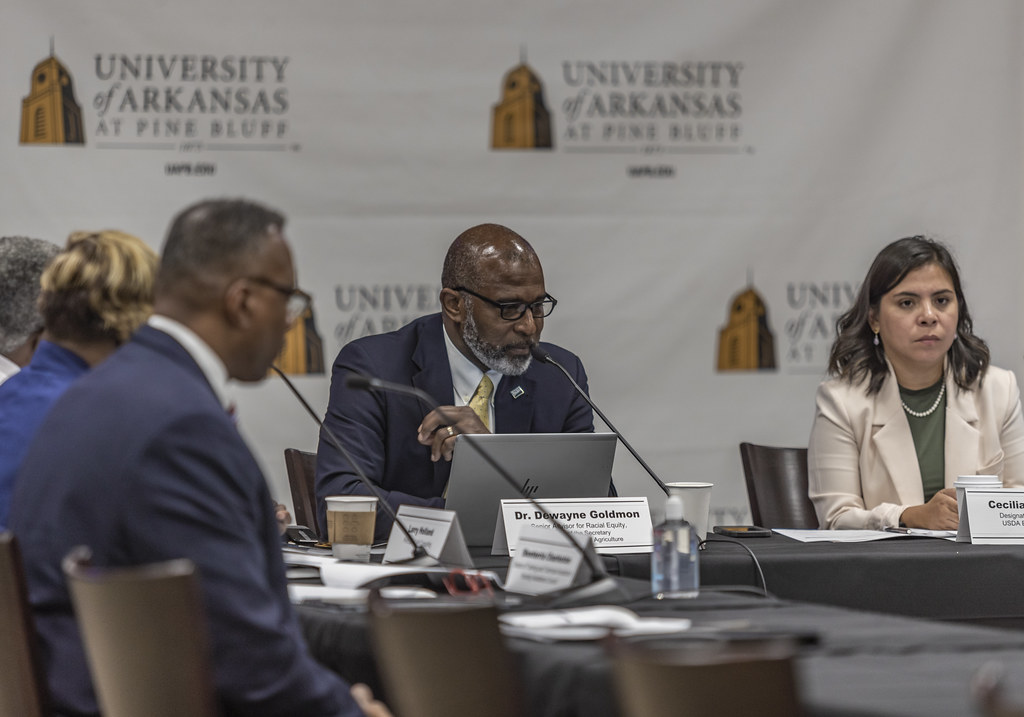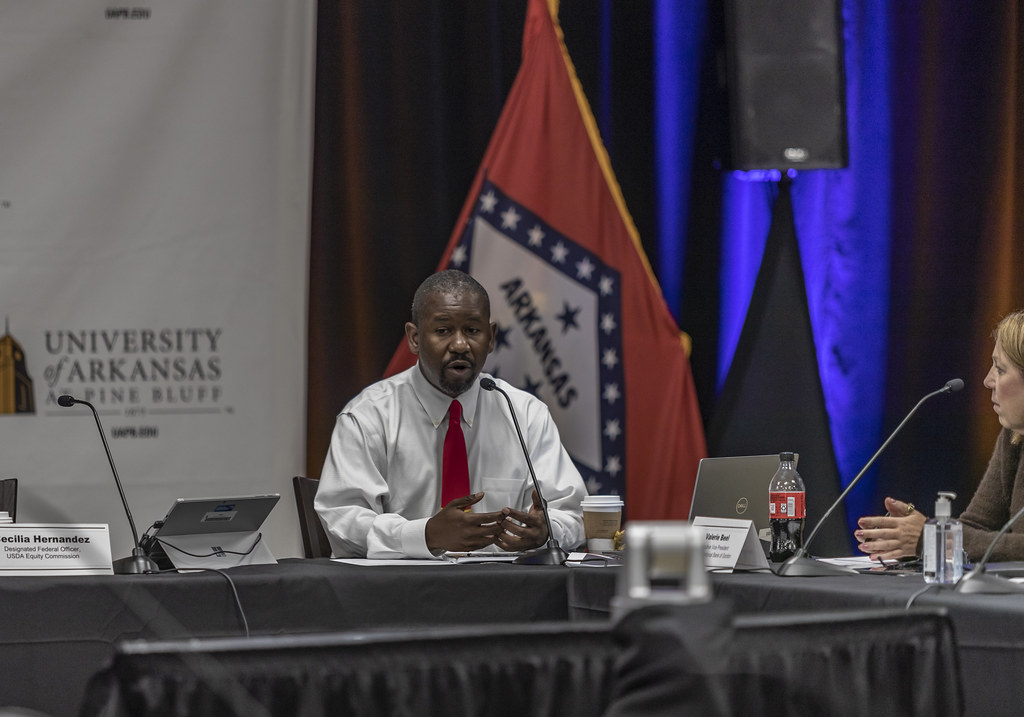Establishing the Equity Commission with USDA Senior Advisors Drs. Dewayne Goldmon and Gbenga Ajilore
[ad_1]
Mar 18, 2024
In January 2021, day one of the Biden-Harris Administration, the President issued Executive Order 13985 that charged the Federal Government, including the U.S. Department of Agriculture, with advancing equity for all, and making the necessary changes to ensure underserved communities are properly supported. Since then, USDA has taken action to understand where barriers to accessing its programs and services exist, identifying opportunities to advance equity and opportunity in agriculture, and changing its programs to remove barriers to access. With this bold and comprehensive action, USDA has committed to closing the racial wealth gap and addressing the department’s longstanding inequities in agriculture.
Secretary Vilsack understood that an important component, and first step in this effort, was involving those impacted most by this critical work. This was the catalyst for the establishment of the USDA Equity Commission (EC), an external group of individuals with expertise in areas ranging from policy design to civil rights, from organizing farm workers to advancing rural economic prosperity, and from legal experience to public relations. EC members bring a wealth of knowledge and represent voices stemming from lending institutions, cooperatives, Tribal entities, colleges and universities, farmers and ranchers, and much more.
Answering Secretary Vilsack’s call to stand up this independent body, Senior Advisor for Racial Justice and Equity Dr. Dewayne Goldmon and Senior Advisor in the Office of the Under Secretary for Rural Development Dr. Gbenga Ajilore made it their mission to establish a Commission that would meet the expectations of the Biden-Harris Administration and Secretary Vilsack. This Commission would need to have long-lasting impacts the Departments operation. With 41 Commission and Subcommittee members, leaders throughout the Department engaged with the Equity Commission on how to analyze how the Department’s programs, policies, and practices further limit access to opportunities for communities that are underserved. “This is a stakeholder-driven process,” Dr. Goldmon says.
Dr. Goldmon is an integral part of the Commission’s journey. As a Black man who grew up on a small farm in Arkansas and became a farmer himself, Dr. Goldmon recalled his growing concerns with equity issues as he connected with other farmers, noting that their voices were not being heard.
“I helped farmers with outreach and began to understand that their needs were not being met, and I had a desire to advocate for those needs,” Dr. Goldmon says.
Like Dr. Goldmon, much of the work done by the Equity Commission members is driven by personal experience and passion for improving outcomes for all Americans. The work of the Equity Commission began in February 2022 with 15 Equity Commission members—entitled to vote at meetings—and 13 Agriculture Subcommittee members. Collectively, these members examined the history of discrimination at USDA, and developed actionable steps the Department could take to achieve systemic change. During this initial analysis of USDA’s programs and services, the Department provided to the members a library of resources, including reports and findings from the Government Accountability Office and other sources, various Executive Orders, and the USDA Strategic Plan and Equity Action Plans to name a few. Dr. Ajilore was an essential connector between the Equity Commission and the Department, delivering the resources to inform commission members where the opportunities existed for a comprehensive approach to actions around equity.
Likewise, the Commission welcomed input from the public and shared their own personal experiences with the Department to garner an understanding of the areas of opportunity and improvement for USDA. “It was heartening to receive criticism from the public and our stakeholders in the beginning of the Equity Commission,” says Dr. Ajilore. “When we receive complaints, it is a sign of a level of trust because it means that person believes we will listen, honor their thoughts, and do something different and/or explain why it’s happening this way, and I can appreciate that.”
In August 2022, the Subcommittee on Rural Community Economic Development (RCED) was formed with 12 members to provide recommendations on issues and concerns related to rural development, persistent poverty, and underserved communities. With prior experience studying issues relevant to rural America and understanding labor market racial disparities at the Center for American Progress, Dr. Ajilore worked closely with the RCED Subcommittee on understanding the barriers to and improvements needed in USDA programs to ensure equitable investments in underserved communities.
Beginning in 2022, the EC held ongoing meetings and calls to start conversations around the core equity issues most important to Americans. That discussion, along with the member’s expertise and background, helped the Commission determine solutions that could improve USDA customer experience and outcomes. “Holding public meetings outside of the DC area has been important to ensure we’re centering work in places like Pine Bluff, Bismarck, and Tucson, where USDA is needed on the ground to address the gaps, this has helped us crystallize the equity work in real time,” Dr. Ajilore remarks. For Dr. Goldmon, supporting the Equity Commission comes down to creating opportunities for bold discussions on the importance of viewing our work through an equity lens. “If we don’t talk about the impacts of prior inequities, those naysayers who don’t believe in what we’re doing will have the opportunity to have plausible deniability,” said Dr. Goldmon.
With an understanding of USDA’s ongoing equity efforts and commitment to improving the lives of all Americans, the Interim Report (PDF, 1.2 MB) included 32 initial recommendations to identify additional steps for embedding equity into the policies, practices, and processes. While the Commission recognized that many of the issues identified are not new issues or concerns, the Members shared that the interim recommendation would require renewed commitment from USDA to improve customer service and address historical inequities. “Commissions and reports historically have gone into a file and collected dust and we’ve known that this [Equity Commission] report wasn’t going to be what was most important – the implementation of the recommendations and the accountability of it is what mattered,” says Dr. Ajilore. “For the final recommendations outlined in the report, we’re actively taking note of what needs to be done to act on the recommendations. We’re laying down a path for advancing equity so that beyond the EC’s tenure, the work will be done. We’re setting it up so that the bus – or the work – can drive forward and anyone can be the driver.”
Following the Interim Report publication in February 2023, USDA examined the recommendations and provided a response (PDF, 642 KB) on work that was currently being done with relevancy to what the Equity Commission outlined. Since then, the Department has acted on the recommendations, with many (or over half) of the recommendations currently underway. “This Commission will be successful when the recommendations implemented provide sustainable solutions that fully address disparities in USDA programs and services,” says Dr. Goldmon.
The RCED subcommittee spent time developing recommendations to be included in the final report along with the interim recommendations following the fourth public meeting. At the fifth public meeting, the RCED subcommittee presented recommendations that introduced topics such as rural housing, infrastructure, broadband, environmental justice, and more. Serving in an official capacity in the Rural Development Mission Area, Dr. Ajilore provided support to the RCED subcommittee to help the members identify a pathway to close the gap between the needs of rural communities and USDA program and services. At the conclusion of the fifth public meeting, the Commission voted to include 22 recommendations from the RCED in the final report.
With the presentation of new recommendations and refinements to previously passed recommendations the Equity Commission voted and passed a total of 66 final recommendations at the sixth public meeting in October 2023. These 66 recommendations span communities across the country and touches on issues ranging from language access to nutrition assistance, and from county committees to citizenship for agricultural workers, and more. By implementing these recommendations, along with the work outlined in USDA’s Equity Action Plans, the Department will address barriers that exist within its programs and services and ensure equity is embedded in all processes, systems, and protocols moving forward.
Dr. Goldmon projects the impact of this implementation to create lasting change when we empower others to promote and integrate equity into the USDA framework. “You start to create this cycle in this environment where it starts feed itself, and you get people that are accustomed to having better services and more access to programs. So, when you threaten to start taking that away, there’s a backlash where people now understand how important it is to have these things. They know what it can do for them, so they become advocates for these programs themselves,” he says.
Looking towards the future, Dr. Ajilore sees equity as the status quo at USDA. “When all is said and done with the Equity Commission and we’re fully underway with implementing and completing the incorporation of the recommendations at USDA, the work will no longer be referenced as Equity Action Plans and Equity Commission work,” explains Dr. Ajilore. “To me, equity means ensuring everyone has the best opportunity to be their full selves. So, in the coming years, this all will just be the work of the Department and the status quo of what we do. It won’t need to be labeled as ‘equity work’.”
The Department is dedicated to creating an equal playing field for all families and communities. To demonstrate this commitment, USDA is advancing an inclusive culture that is championing dignity, respect, and equality in opportunities that will build a good life for all Americans and help them thrive in the communities they love. As Dr. Ajilore says, “Today’s vision becomes tomorrow’s reality.”
The USDA Equity Commission delivered its Final Report (PDF, 2.0 MB) to Agriculture Secretary Vilsack in February 2024. The report is informed by the work of the Commission and its Subcommittees on Agriculture and Rural Community Economic Development and identifies a wide-ranging set of recommendations for ways USDA’s headquarters operations, field offices across the country, and its various program areas can make changes to better serve the unique needs of the Department’s many and diverse stakeholders. The Report is available in both English and Spanish.
[ad_2]



